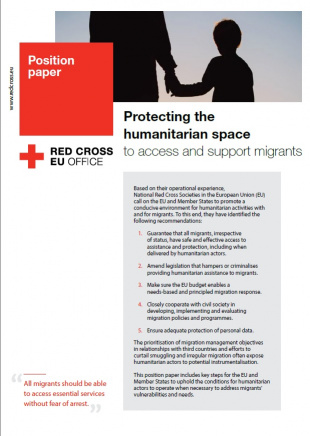Protecting the humanitarian space to access and support migrants
The European Union (EU) and Member States are increasingly relying on humanitarian actors to address the consequences of current policy choices on the vulnerability of migrants. However, the space for civil society actors to provide them with support in accordance with humanitarian principles has been significantly compromised in recent years.
National Red Cross Societies in the EU would like to remind Member States of their commitments to ensure that staff and volunteers in different countries are able to deliver humanitarian assistance to all migrants based solely on needs, and to support their access to services as well as their obligations in this regard. With the Global Compact for Safe, Orderly and Regular Migration, Member States have reaffirmed their responsibility to uphold migrants’ access to essential services, regardless of their status. When they are unable to do so, Member States need to facilitate the work of humanitarian actors. Despite this, National Red Cross Societies increasingly experience challenges to act in accordance with their fundamental principles when delivering services and supporting all migrants in accessing the necessary support to ensure their safety, dignity, protection and well-being.
Recommendations
National Red Cross Societies in the EU thus make the following recommendations to the EU and Member States to secure a conducive environment for humanitarian actors to address migrants’ vulnerabilities and needs, as well as mitigate the risks they face.
- Guarantee that all migrants, irrespective of status, have safe and effective access to assistance and protection, including when delivered by humanitarian actors.
- Amend legislation that hampers or criminalises providing humanitarian assistance to migrants.
- Make sure the EU budget enables a needs-based and principled migration response.
- Closely cooperate with civil society in developing, implementing and evaluating migration policies and programmes.
- Ensure adequate protection of personal data.


